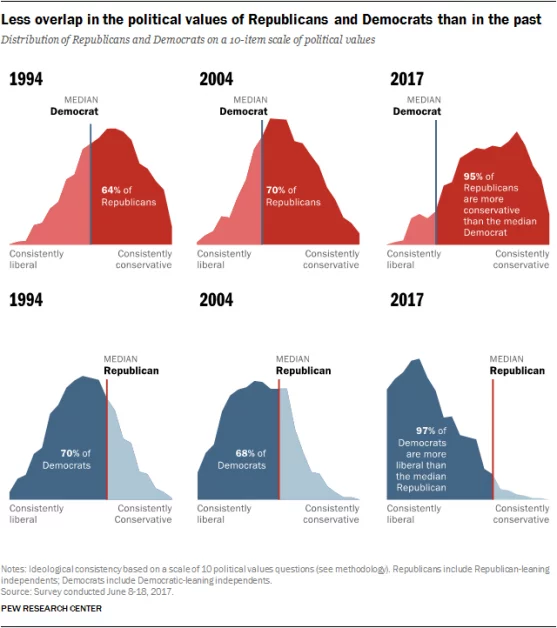Information can be both a blessing and a curse. Not enough and we tend to make poor decisions that harm us and others. Too much, however, and we become stuck by analysis paralysis, and often avoid making decisions altogether.
Too Little and Too Much Information are Both Problems
Before the millennium, a lack of information (quantity) created the most significant barrier to quality decision-making. This is now no longer the case; with fingertip access to an almost infinite amount of information via the internet, the quality of information now presents the greatest challenge.
Anyone can write and publish information to be presented before any target they choose, whether it be via websites, social media, or paid advertising. And thanks to digital experts who know how to manipulate algorithms (advertising, SEO, e.t.c.), the quality and accuracy of information are now becoming less important for spreading content.
This presents a problem for those of us seeking quality information with which to make good decisions.
We must be able to distinguish quality objective information from the subjective and inaccurate because without it, we are doomed to make poor uninformed decisions under the duress and influence of those who purposely push poor information for their own gain.
Without the ability to filter information to determine its quality, we are doomed to be unintentional servants to those who have the power to spread it.
This article aims to help you assess the quality of information you seek, how objective it is, and how to find the best information to make the best decisions possible while avoiding misleading and subjective information.
Some will be obvious; fake news has been all over the media for the best part of a decade now. Others, however, are much more subtle. You may be surprised to learn of the many ways you may be covertly being fed biased information. Knowledge is power, but knowledge depends on the quality of information we use.
We are Predisposed to Accept Misinformation
As if pushing poor-quality information for personal gain isn’t bad enough, the problem is compounded by our natural tendency to be drawn toward biased information.
This tendency to make decisions or take action in an unknowingly irrational way is referred to as cognitive bias. It boils down to a set of predictable mental errors that arise from our limited ability to process information objectively. It can result in irrational decisions, and it can cause you to misjudge risks and threats.
Information is now big business, and biased organizations, such as journalists, marketers, and politicians, have personal agendas to spread misinformation that prioritizes self-gain over accuracy. And they know exactly how to go about doing it – by exploiting our natural tendency to focus on the emotion of a story, not the logic.
This proclivity to focus on emotion is due to the “negativity bias”, an inherent tendency to focus on negative stimuli greater than positive stimuli. Although seemingly counterintuitive, we do this for a very good reason.
Our past survival has depended on our ability to avoid danger (survival of the fittest). A split-second decision of whether something poses a potential danger can spell the difference between life and death. In more primitive times, before the safety of modern civilizations, we depended on this fight or flight response to survive.
When we walk down a dark alley, for example, and encounter a group of hooded youths lurking in the shadows, our subconscious mind assumes the potential for danger, even though we know nothing about this group of people nor their intentions.
Our subconscious mind assumes a threat because it is far safer to overestimate a potential danger than it is to underestimate it. Hence our tendency to react to negative stimuli is greater than to positive ones.
As a result, our emotional subconscious mind is five times faster to react than our rational conscious mind. If this weren’t the case, and we had to analyze every emergency without impulsive emotional input, we likely wouldn’t be able to react quickly enough to emergencies.
While people like to believe that they are rational and logical, the fact is that people are continually under the influence of cognitive bias. But it is not our fault, it is simply nature doing what it does best; survival at all costs.
We, therefore, have to always be mindful that our emotions will often react to new information before logic, not through any fault of our own, but because of the natural negativity bias mechanism.
We shouldn’t seek to eliminate it, however, because it serves to protect us from physical harm. Instead, we need to understand and be mindful of when it is affecting our decisions in a harmful manner. In other words, we need to learn to work with it.
Consequences of the Bias
When faced with new information, we are likely to first react emotionally as opposed to logically. Brexit was a prime example; having faced years of austerity, cash-strapped Britons were quick to pick up the misleading allegation that immigrants are leaching off the system, therefore reducing the resources available for indigenous Brits. In hindsight, we now know that this simply wasn’t the case.
Brexiteers claimed that migrants were stealing Briton’s jobs, that an independent UK would reclaim control over its borders, and that immigrants drain resources, such as healthcare, education, and welfare, thereby reducing the quality of resources available for natives.
The Office of National Statistics, however, shows that the number of British citizens working in the UK labor force is now at a near-record level of 28 million, compared with just 3 million foreign nationals. Furthermore, the UK is already in control of its borders; EU workers can legally be required to leave after three months if they do not have a job or fulfill other conditions, such as being able to support themselves financially.
Had this purposely misleading information not been pushed to the public by a small group of partisan politicians, (or had the public been able to identify and avoid misleading information, as is the aim of this article), Brexit, and its burdensome consequences, could have been avoided.
Some consequences of cognitive bias are obvious. Misinformation on vaccine safety following the Covid pandemic promoted the growth of the anti-vax movement, a paranoid but influential group that claims that vaccines are harmful. Despite decades of vaccines, from smallpox to typhoid, having proved lifesaving, covid vaccines bought mass hysteria for some.
Just a handful of people have been attributed to spreading such influential misinformation. Researchers from the Center for Countering Digital Hate have found just 12 people who are responsible for the bulk of the misleading claims and outright lies about COVID-19 vaccines that proliferated on Facebook, Instagram, and Twitter.
Dubbed the ‘Disinformation Dozen’, an estimated 65 percent of the shares of anti-vaccine misinformation on social media platforms stem from this group. This goes to show the sheer power of information when it is used detrimentally.
There is no shortage of groups spreading poor information, whether intentionally or not. In 2020, QAnon supporters flooded social media with false information about Covid-19, the Black Lives Matter protests, and the presidential election, and recruited legions of new believers to their ranks.
A December Poll by NPR and Ipsos found that 17 percent of Americans believed that the core falsehood of QAnon — that “a group of Satan-worshiping elites who run a child sex ring is trying to control our politics and media” — was true.
The damage from false information such as this is very tangible. Misinformation around the safety of vaccines means fewer vaccinations and more deaths. Of the more than 641,000 people who died after vaccines were available, an estimated half of these could have been averted.
That would mean 318,981 mothers, husbands and grandparents would still be alive had every eligible adult gotten vaccinated (statistics from Brown School of Public Health and Microsoft AI for Health, May 2022).
Political polarization in the US is at an all-time high, pushing a larger share of people to the extremes. The graphic below for the PEW Research Center demonstrates how the political divide by a party has grown significantly and consistently over 23 years.
In 1994, the general public was more mixed in their allegiances, but a significant divergence started to occur from 2011 onward. This leads to the hyperbolic and biased media we have today and explains the increasing numbers of protests and general civil unrest experienced over the last decade.

Other consequences are much more subtle, however, and it is these that we should be more interested in, because they influence the way we interact with others, and the decisions we make, in our daily lives.
With poor or incomplete information, we make inaccurate judgments of others and we are, therefore, less likely to develop potentially fruitful relationships. When a friend tells you not to talk to Jonathon because of a bad experience they had, we go into our next meeting with them already hostile. Barriers are made before starting and any lucrative interactions are already diminished.
Even your tendency to procrastinate may stem from a cognitive bias against the work you are supposed to be doing.
When planning to start a business, you will be told by many how difficult it is, and that you shouldn’t leave your steady job. “90 percent of businesses fail in their first five years” and “you will have to work 12 hours a day, 7 days a week for years just to break even” are just two of the discouragements I received when I finally started mine.
This can be discouraging, especially coming from those who are supposed to be supportive. But none of those who displayed this discouraging behavior had ever even thought about starting their own business, much less had experiential advice to offer. Would you let a French speaker teach you Cantonese? So why would we let someone equally inexperienced influence our business decisions? Such is the power of cognitive biases.
I dread to think how many entrepreneurs did not go on to create potentially lucrative businesses because they were discouraged in some form. I dread to think how many Picassos, Mozarts, and Michael Jordans never came to be because they were deterred. Don’t let this be you. Learn to identify where these biases stem from in order to avoid them.
Where the Bias Stems From
There are a plethora of sources where cognitive biases stem from. The list below highlights some of the most common and influential in our daily lives.
1) Confirmation Bias
Confirmation bias is apparent whenever we subconsciously look for information that supports our existing beliefs and reject information that goes against it. Here we are looking for subjective emotional evidence and not objective facts. People on two sides of an issue can listen to the same story and walk away with different interpretations that they feel validate their existing point of view.
Politics is a prime example; nearly half (47 percent) of those who are consistently conservative name Fox News as their main source for government and political news (pewresearch.org).
Fox News is notorious for its right-wing views, however, and is unlikely to promote fair and balanced opposing views to allow its watchers to draw their own conclusion in accordance with all the facts. In fact, Fox News dropped its “Fair and Balanced” motto in 2017.
Poor information stems from our inherent tendency to look for information and views that match our preconceived views based on emotion and without due care for facts. We are all guilty of this, albeit some more than others. Ensure you seek information with an open mind, even if it invokes unpleasant emotions.
2) Anchoring Bias (First Impression Bias).
Also known as the first impression bias, anchoring occurs when we stick with the first thing we hear, despite factual evidence later that it may be incorrect. For example, a typical car dealership may display a vehicle at $10,000 and eventually lower the cost to $8,500, leaving you feeling like you now have a good deal that you can’t walk away from.
In reality, the dealer knows the value of the vehicle is $8,000, but preys on your lack of market knowledge and anchoring bias to inflate the price.
To counteract this, we should seek to do our own research on the vehicle, such as looking through impartial market guides and seeing what other similar vehicles are selling for.
3) Bandwagon Bias
This bias relates to the tendency people have to adopt a certain behavior, style, or attitude simply because everyone else is doing it. Whether it be new diet fads, politics, fashion, or new social media apps, the more people adopt a particular trend, the more likely it is that others will follow.
This bias to follow trends relates to our primal urges. Mankind has relied on safety by numbers to survive, and so disconnecting yourself with differing views from your troop (society, friendship group, culture e.t.c.) causes feelings of isolation, and can therefore be dangerous.
To counteract this effect, we need to be mindful that our subconscious mind may react emotionally to information that might prevent us from jumping on the bandwagon. But just because something is popular doesn’t mean it is the best course of action.
Aside from the differing types of cognitive bias, there are other more immediate sources where information bias stems from.
Watch Out For These Bad Influences
1) Friends and Family
Friends and family are perhaps the most common, and most influential source of bias. Motivational speaker Jim Rohn once said that we are the average of the five people we spend the most time with. So if someone is born to a gay family, they are more likely to become more accepting of homosexuality than those born to homophobic families.
It is easy to accuse homophobes, racists, narcissists, and the like of being naive, ill-informed, and ignorant (which they often are). But the sad truth is that you would likely be the same had you been born under similar circumstances.
The example mentioned earlier showed how parents can sometimes cause us unintentional harm by preventing us from taking risks.
Because they care for us, they often would rather us not take a risk, despite the potential reward, such as by advising us not to quit a stable job to start a business. Their primal minds think emotionally, and hence are most concerned with ensuring we survive as opposed to helping us thrive.
Friends can do the same, but for different motives. They might discourage you from starting a business because they heard that “9 out of 10 businesses fail within a year” or “the upcoming recession is not a time to take out a loan”.
Their emotional rationale, however, may be jealousy, even if unintentional. Their emotional mind reacts to the fear of being left behind (i.e. isolation from the safety of the group) if you become successful, and instead of reacting with encouragement and praise as a friend would rationally do, they react with envy. It is easier for their emotional mind to bring you down to their level than it is to raise themselves to yours.
This is why it is so important to be open-minded, so we can pass this critical thinking skill onto our children, and then their children until the whole population is saturated with fair and balanced thinkers.
Okay, so maybe this is wishful thinking, but we have a duty to ourselves and others to remain rational when others react emotionally.
2) The Internet
The internet has every piece of information available for you to achieve whatever you want. It also has information that will stop you in your tracks. The difficulty, therefore, is separating the useful information from the inhibiting to filter out misleading information.
Websites have an incentive to prioritize agendas over accuracy. Political parties seek nomination. News websites seek views for advertising. Social media users push out whatever information they desire, often changing multiple times depending on their agenda at the time.
Opening any social media and we are instantly bombarded with news and forums about world events. To make matters worse, algorithms learn your viewing habits and push information that matches it in the hope of more interaction (more clicks and views mean more advertising revenue). This makes it even more likely that biased information will be pushed to you without you having much awareness of it.
To date there has been very little regulation in this sector; it expanded far quicker than regulation and legislation could keep up. Although now serious attention is being paid to this industry, the damage is already being done.
How to Avoid the Bias
Since the quality of our decisions (the output) is derived from the quality of information available (the inputs), we should focus our efforts on obtaining and interpreting the best quality information we can. To aid in this, we should always keep the following questions in mind whenever we come across information we wish to use.
3 questions you should ask when ascertaining the quality of information:
1) The Qualifications
I’m not just talking about academic qualifications, such as degrees or titles. I am talking about experiences and knowledge. If you wish to learn self-defense, for example, you should seek to find a coach who has physical experience in defense. Anyone can read about self-defense techniques, but unless you have been in real situations, the usefulness of information will always be limited
Validate if they are justified in writing about a topic. Scientific data should be acquired from qualified sources, for example, scientific journals should be written by someone who has the appropriate qualifications and facilities surrounding them.
Does the author have both knowledge and experience in the field? A family member who is discouraging you from starting a business, for example, may have acquired the knowledge that 9 out of 10 businesses fail in the first five years (usually by reading an article), but unless they have any business experience, their input will always be limited.
If you cannot verify the qualifications of the source, in terms of both knowledge and experience, take the information with a pinch of salt. You don’t need to discard it altogether, even a broken clock is correct twice a day. But identify the uncertainty surrounding the information and look to acquire additional information from more qualified sources.
2) The Motive
Look for a reason why someone might have cause to be biased. A car salesman will tell you how his car is the best in its class, but the commission he will receive once sold affects his motivation away from accuracy. Instead, we should look for forums and multiple online reviews before making a decision.
Seek impartial information. This can be more difficult than it sounds; it is surprising the number of sources that suffer from some sort of bias. Where this isn’t always possible, make sure you seek out opposing points of view.
When reading about politics, for example, balance the right-wing articles with the left-wing, no matter your personal views and feelings. With this information, use your reasoning to draw your own conclusion.
Personal gain is the largest source of bias. For online content and social media, financial agendas are common, because greater interaction (clicks, views, e.t.c.) results in greater revenues. It doesn’t always mean the source is biased of course, but it is an indication that you should remain vigilant.
3) The Opposing Views
Finally, actively look for information that opposes what you’re looking for. Rigid scientific experiments will test opposite hypotheses to either weaken or strengthen their original hypothesis, thereby identifying more information that helps to bring you closer to the truth.
Interact with multiple people of different groups. When you seek information from a small number of groups, the data is more likely to be inherently biased.
Seek out multiple sources of information. Having spoken to someone who failed to create a business, and warns of the perils of starting your own, speak to others who have successfully created one and learn of their insights. Always seek to balance information from multiple sources. Two biased sources on opposite extremes will at least make you aware of potential biases.
Conclusion
Good accurate information which we can use to make informed decisions is the lifeblood of success in the digital age. All the information we could want is out there, the problem is distinguishing it from the poor and biased. We must therefore learn how to filter quality information over all the garbage that outnumbers it.
This requires an open mind at all times. It is natural for us to seek and react to biased information which agrees with our emotional cognitive biases. But remember to remain impartial as best you can and concern yourself only with the facts. Treat everything as a rumor until enough information is available to certify it. An open and unbiased mind is the most powerful weapon in our self-improvement arsenal.
But don’t just take my word for it. Do your own research.
FAQs
Why do we fall for misinformation so easily?
Humans are wired with cognitive biases—especially the negativity bias—which causes us to react emotionally before we think logically. This makes us more vulnerable to misleading, emotional, or fear-based information.
How can I tell if information I’m reading is biased or inaccurate?
Check three things: qualifications (does the source have expertise?), motive (do they benefit from persuading you?), and opposing views (does contradictory evidence exist?). If any are unclear, treat the information cautiously.
What’s the best way to avoid cognitive bias when making decisions?
Stay aware of your emotional reactions, seek multiple perspectives, and deliberately read viewpoints that challenge your own. The more open-minded your inputs, the clearer and more rational your decisions become.






2 Responses
Thanks for your blog, nice to read. Do not stop.
Glad you enjoyed it. Thanks Mark